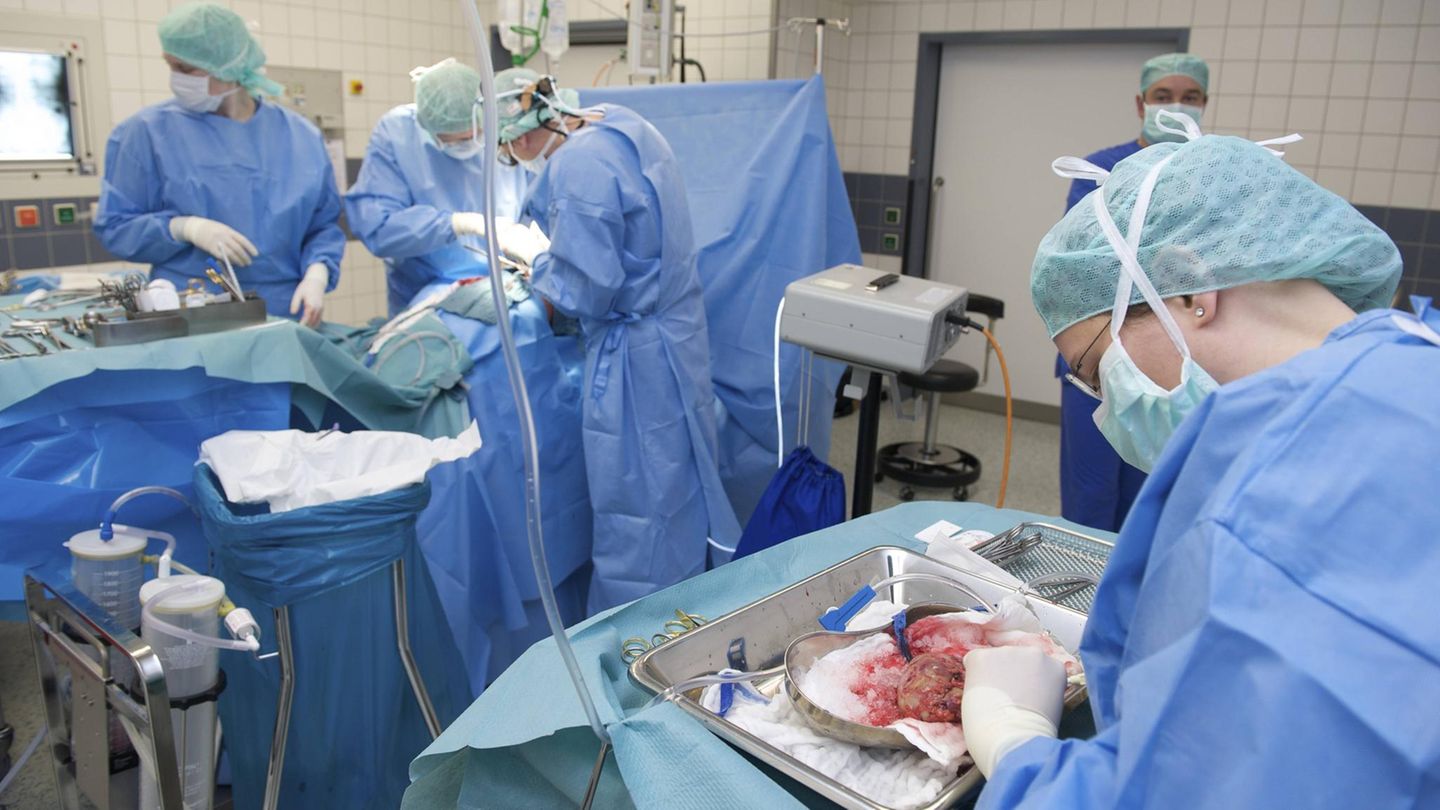There are not enough organ donors in Germany; an average of three people die every day. That should change. Dem star There is a bill from Health Minister Lauterbach that would make kidney donations much easier.
Susanne Reitmaier’s daughter was eleven years old when her kidneys failed. To save the child from years of dialysis and an early death, her father donated his kidney. Years later, when she no longer worked, an aunt offered to make a second living donation. But the tissue characteristics did not match: Simone Reitmaier’s body would have rejected her aunt’s organ. The situation seemed hopeless.
But Susanne Reitmaier is a fighter. The mother herself organized a “ring exchange” to Spain, also known as a “cross-over donation”. Two or more couples are brought together, one of whom is willing to donate and the other who needs a donation, but who cannot donate to each other. In the Reitmaiers’ case, three couples were even involved. The aunt’s kidney was donated to a sick person in Valencia, from there a kidney went to a person affected in Madrid, from where daughter Simone received a new organ.
Back in Germany, Susanne Reitmaier wanted to promote this procedure here too. But it fell on deaf ears, even among affected groups. Because what has long been common practice in countries like Spain was previously not permitted in Germany. The Transplantation Act only allows “cross donation” if there is a “special personal bond” between couples willing to donate.
In practice, this meant that such donations were occasionally made, but under difficult conditions. The respective couples first had to build a relationship before a transplant was possible. This was a high hurdle, especially for those with severe kidney disease who have to have their blood cleaned for hours using dialysis three times a week.
Donors receive a “trustee”
This should now be finally eliminated. According to information from star Federal Health Minister Karl Lauterbach (SPD) is planning a change to the transplant law that will make cross donation easier.

From a draft bill that… star available, it appears that in the future cross-donations can also be made without any particular proximity. Only the affected donor couples must continue to be close to each other, for example through a marriage or other close family relationship. If the kidney cannot be donated directly due to incompatibility, the kidney will be given anonymously to another suitable donor pair. The organization is taken over by the transplant center. The aim of anonymity is to prevent money from being paid for an organ.
Other important changes:
- In principle, so-called anonymous, non-directed kidney donations should also be permitted in the future. Theoretically, anyone could donate a kidney selflessly – without having any influence on who gets it. Sounds unrealistic? . In some cases there is even a public call for it.
- The previous regulation that living donation is only possible if the organ of a dead person is not available will be deleted.
- Donor protection is strengthened. In the future, donors will be assigned an independent “person of trust” who will accompany them throughout the entire process.
If everything goes according to plan, the regulation could come into force at the beginning of 2025. The Bundestag still has to agree. There are supporters of the new regulation in practically all parties.
“It gets people off the waiting list of suffering.”
Experts estimate that the new regulation could result in around 100 more living kidney donations per year. That may not sound like much at first glance. Given that around 600 kidneys from living donors are currently being transplanted, an increase to 700 would be a significant number.
Professor Klemens Budde is head of the kidney transplant center at the Charité Berlin. He believes the new regulation is overdue: “Every step towards more donations helps to free people from dialysis and get them off the waiting list of suffering.” However, one should not have any illusions, warns Budde: “It will only marginally improve the fundamental shortage of donor organs.”
The nephrologist therefore sees the new regulation of cross-donation as just one of several sensible measures. Like other transplant doctors, he also advocates allowing organ donations after a cardiovascular death in Germany. In contrast to other countries such as Spain, in Germany organs can only be removed after brain death has been diagnosed if the heart is still beating. If the circulation is no longer intact, no organ may be transplanted. Many experts believe this ban is wrong.
“That is not enough”
Frank Friedersdorff, chairman of the kidney transplantation working group and professor of urology at the Queen Elisabeth Hospital in Herzberge and at the Charité in Berlin, also welcomes the new regulation. “The introduction of a person of trust strengthens the protection of donors,” he says. “Expanding the circle of donors by abolishing proximity will also make living donations easier and safer. While so-called ‘blood group incompatible’ living donations are still often carried out today, this can be minimized in the future through cross donation.”
The background: Due to the current strict requirements for living donations, transplants are often carried out even if the blood groups of the donor and recipient are not compatible. This is a very complex and expensive procedure because the recipient’s immune system must be “switched off” in a highly specific manner.
But Friedersdorff also says of the new regulation: “This is not enough to remedy the organ shortage.”
Nobody knows better how much organ donation changes lives than Susanne Reitmaier’s daughter. She is now 40, in good health and after the donation she was able to do something that she would not have been able to do as a dialysis patient: she became a mother. Her daughter is now four years old.
After her daughter’s successful transplant, Susanne Reitmaier founded an association (“Against Death on the Waiting List”) that advocates for more organ donations. And she has created a list into which candidates for a “cross-over donation” can be included. 60 people are currently standing on it. After admission, a mathematician checks whether there is a “match” with another affected person, i.e. whether the blood group and tissue characteristics match. If this was the case, Reitmaier invited both couples to Wolfsburg in the past in order to create the necessary closeness.
Reitmaier has already helped three couples get new kidneys and she has placed six others abroad. This is legally possible with a cross donation, but it is expensive. In Spain the personal contribution is 100,000 euros and more, in Turkey it is still 20,000 euros.
“I’m really happy,” says Reitmaier about the news that cross-donation will also be easier in Germany in the future: “I fought for this for seven years.”
The fight is not completely over for them. She and her association want to continue to work to ensure that the contradiction solution is put back on the political agenda. This stipulates that every German citizen is theoretically an organ donor if he or she does not actively object. This regulation has also long been standard in other countries such as Austria and Spain. In Germany, the Bundestag voted against the introduction of the regulation at the beginning of 2020.
Source: Stern
I have been working in the news industry for over 6 years, first as a reporter and now as an editor. I have covered politics extensively, and my work has appeared in major newspapers and online news outlets around the world. In addition to my writing, I also contribute regularly to 24 Hours World.




